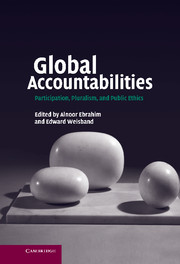Book contents
- Frontmatter
- Contents
- List of tables
- List of figures
- Acknowledgments
- List of contributors
- 1 Introduction: forging global accountabilities
- Part I Public accountability: participatory spheres from global to local
- Part II Experiments in forging NGO accountability: mutuality and context
- Part III Reflective accountability: new directions for participatory practices
- 8 A rights-based approach to accountability
- 9 Evaluation and accountability in emergency relief
- 10 Towards a reflective accountability in NGOs
- Part IV Global accountability frameworks and corporate social responsibility
- Index
- References
10 - Towards a reflective accountability in NGOs
Published online by Cambridge University Press: 22 September 2009
- Frontmatter
- Contents
- List of tables
- List of figures
- Acknowledgments
- List of contributors
- 1 Introduction: forging global accountabilities
- Part I Public accountability: participatory spheres from global to local
- Part II Experiments in forging NGO accountability: mutuality and context
- Part III Reflective accountability: new directions for participatory practices
- 8 A rights-based approach to accountability
- 9 Evaluation and accountability in emergency relief
- 10 Towards a reflective accountability in NGOs
- Part IV Global accountability frameworks and corporate social responsibility
- Index
- References
Summary
The preceding chapters in this volume have laid out two general challenges to our current understandings of accountability in NGOs. First, many of the authors have questioned traditional framings of the concept, especially principal–agent views in which NGOs are primarily seen as the passive subjects of external oversight and punishment. The second challenge posed by the contributors is thus a practical one – to find new forms of accountability which enable, rather than constrain, innovation, creativity, and agency for long-term social change. The purpose of my present chapter is thereby also twofold: 1) to provide a conceptual synthesis and discussion of the key problematics of accountability facing development NGOs; and 2) to offer a practical review of how an accountability system might be shaped to take on a more enabling role, particularly with respect to promoting critical reflection and learning within NGOs.
With respect to the first aim, several contributions in Parts I and II have pointed to two key deficiencies in problematizing the concept of accountability. First, the authors feel stifled by myopic conceptualizations of the term and thus argue for more nuanced and visionary framings of accountability. For example, Goetz and Jenkins are dissatisfied with standard mechanisms of “vertical” accountability for holding public agencies and officials to account (e.g., electoral systems and lobbying) and “horizontal” accountability (e.g., public agencies holding one another to account through legislative oversight, auditing, or judicial action).
- Type
- Chapter
- Information
- Global AccountabilitiesParticipation, Pluralism, and Public Ethics, pp. 193 - 224Publisher: Cambridge University PressPrint publication year: 2007
References
- 18
- Cited by



